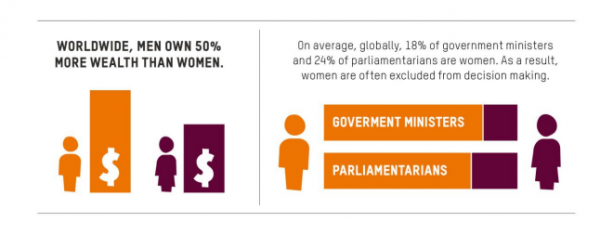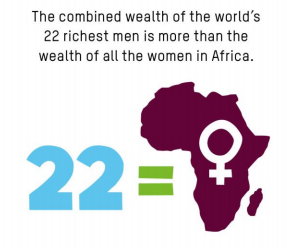“Governments around the world can, and must, build a human economy that is feminist and benefits the 99%, not only the 1%.” That’s the inescapable truth contained in Oxfam’s annual report on global inequality.
The report Time to Care was released to coincide with the opening of Davos, the World Economic Forum’s annual powwow for the world’s most influential elite, including 119 of the 2,153 billionaires who, as the report makes plain, own more wealth than 60 per cent world’s population. Just 22 of them are richer than the sum of all the women in Africa.

If everyone in the world were to pile up their wealth in $100 bills, most of humanity would be sitting in the dirt on the floor. The middle classes would be sitting on a chair, while the world’s two richest men… would be sitting in outer space.
It makes the point, rather frivolously, that if everyone in the world were to pile up their wealth in $100 bills, most of humanity would be sitting in the dirt on the floor. The middle classes would be sitting on a chair, while the world’s two richest men – Jeff Bezos ($116.4 billion) and Bernard Arnault ($116bn) – would be sitting in outer space.
Davos might be a solutions-focused forum for the world’s most complex problems but the billionaires – both those in attendance and those who aren’t – are actually a big part of the problem.
“This great divide is based on a flawed and sexist economic system.”

As the report says: “This great divide is based on a flawed and sexist economic system. The broken economic model has accumulated vast wealth and power into the hands of a rich few, in part by exploiting the labour of women and girls, and systematically violating their rights,” the report says.
This report makes is heart-wrenching reading. It speaks of the 12.5 billion hours every day that women and girls who live in poverty put in each and every day doing work for free. That unpaid and unrecognised effort is valued at US$10.8 trillion dollars to the global economy.

Gina Rinehart
For the record, Forbes has estimated that only one in ten billionaires are women, of which Australia’s Gina Rinehart has, in just seven years dropped from pole position to ninth richest woman in the world (with a mere $15.2bn in wealth).
Australia needs to take heed. Not only should our foreign aid agenda be seen through a gendered lens, things are not all hunky dory back on the home front, as the WEF’s Global Gender Gap report published in December makes clear.
As we reported in BroadAgenda at the time, “In 2006, we were ranked a solid #15. Since then, we’ve been on an almost continuous downwards slide. Last year, we sat at #39 out of 149 countries. This despite the fact that we’ve consistently kept our number #1 status in ‘educational attainment’. Now, as we head into 2020 Australia is ranked a miserable #44 in the world for gender equality overall.”
Australia has gone backwards on every measure of gender equality (except education). Since the World Economic Forum began ranking nations nearly a decade and a half ago, we have slipped from 12 to 49 on economic participation and opportunity. From 32 to 57 on political empowerment and, devastatingly, from 57 to 104 for health and survival.
And perhaps that is a stark reminder that Australia, for all its vast cosmopolitan sophistication, is also home to some indigenous communities where health and living conditions are considered an international disgrace.
This Oxfam report is not something we can shrug away as someone else’s problem. Government policies that seek to lower taxes to the rich, which silently place the burden of child and elder care in the arms of women; and which protect harmful norms and sexist behaviour – as we have witnessed all too often on the floor of Parliament House – should be called out.
 For the full Oxfam report, click here …
For the full Oxfam report, click here …




